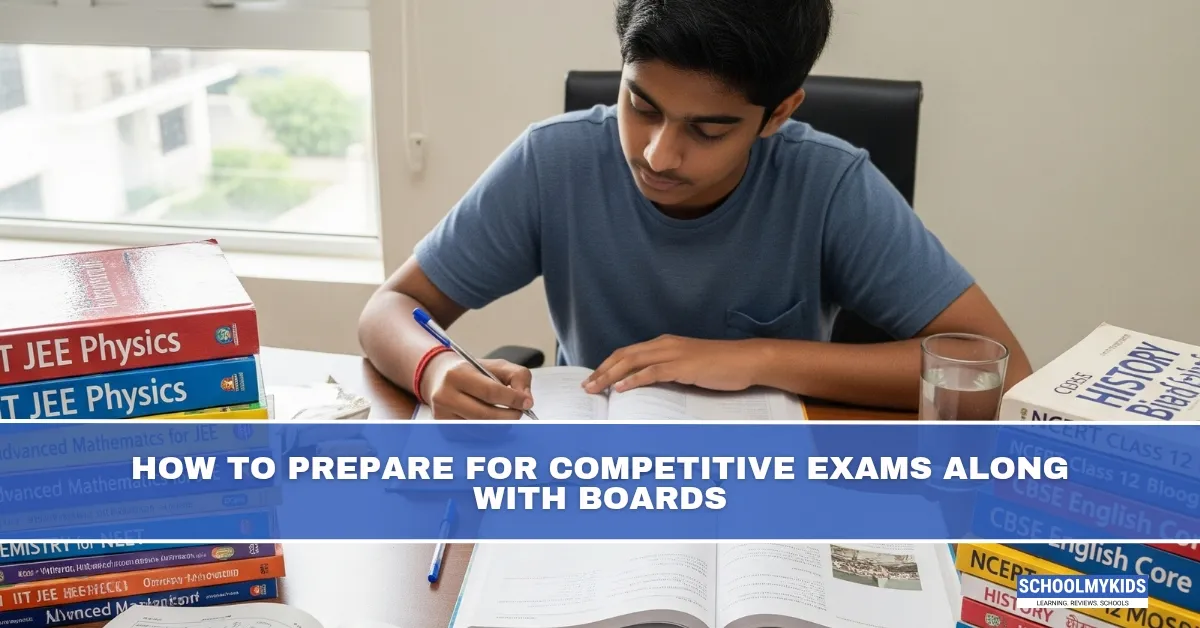Balancing board exams and competitive exams is like trying to juggle two burning torches — drop one, and you’re in trouble. Every student who has sat in Class 12 knows the anxiety of having to prepare for both: the board exams that define your school life and the competitive exams that decide your future college. The key to surviving this double challenge isn’t just about working harder but working smarter.
Understand the Different Demands
The first step is to recognize that board exams and competitive exams don’t measure the same things. Boards are descriptive and reward memorization, clarity, and structured answers. Competitive exams, whether it’s JEE, NEET, or others, focus on problem-solving speed and conceptual depth. Trying to study for both with the same approach is like training for a marathon and a 100m sprint with one workout plan — it won’t work.
Sync the Syllabus
Fortunately, there’s a big overlap. Physics, Chemistry, and Math/Biology topics you study for boards are the foundation for competitive exams. The trick is in the detailing. For boards, you need to write neat, stepwise answers. For competitive exams, you must practice applying those concepts to tricky questions under time pressure. Building your timetable around this overlap reduces duplication and stress.
Build a Smart Timetable
Divide your day in a way that respects both goals. Mornings, when the brain is fresh, can be used for solving competitive exam questions — the kind that demand logical reasoning. Evenings can be spent revising for boards, which often require detailed reading and writing practice. Make sure to build in short breaks. Burning out midway is worse than going slow and steady.
Practice Like It’s Real
Competitive exams are time traps. Practicing under timed conditions is non-negotiable. Take mock tests regularly and analyze your mistakes. For boards, past-year question papers are gold. Not only do they show you the type of questions likely to come, but they also train you to write faster while staying neat.
Don’t Neglect One for the Other
A common mistake is to favor competitive exams at the cost of boards, or vice versa. Both matter. Good board marks are still required for admissions and scholarships, and competitive exams open doors to elite colleges. Treating one as “less important” will only hurt you later.
Health Is Strategy Too
No strategy works if your body gives up. Students often sacrifice sleep, meals, or exercise, thinking it’s a trade-off for more study time. It isn’t. A tired brain can’t solve physics numericals or recall essay points. Even light exercise, like a walk, improves memory and reduces stress.
Stay Mentally Balanced
The pressure of managing two exams can be overwhelming. Some days you’ll feel like you’re failing at both. That’s normal. Talking to peers, parents, or teachers about your struggles can stop you from spiraling into burnout. Break your tasks into daily goals and celebrate small wins. That sense of progress keeps you moving forward.
Final Thoughts
Preparing for competitive exams alongside boards is not about perfection, but balance. It’s about creating a strategy that respects the unique demands of both, leveraging overlaps, and maintaining your mental and physical health. Remember: thousands of students crack this challenge every year. The difference between those who succeed and those who burn out isn’t talent — it’s planning, consistency, and resilience.








Be the first one to comment on this story.